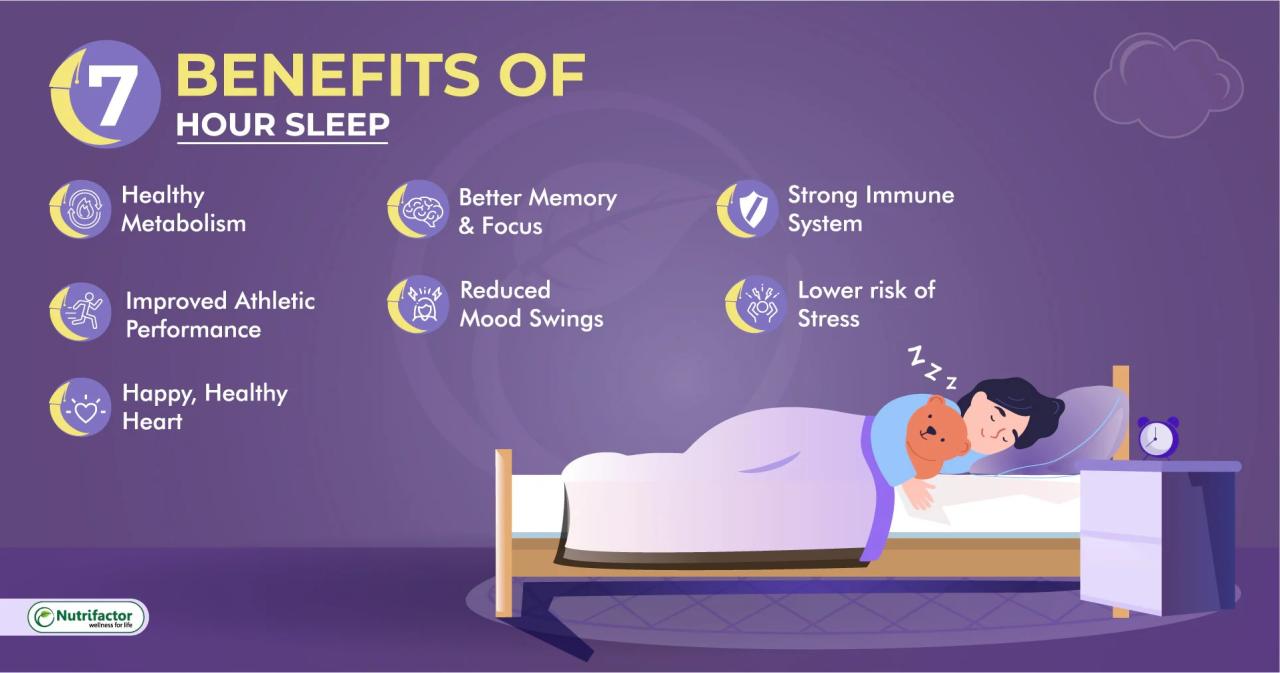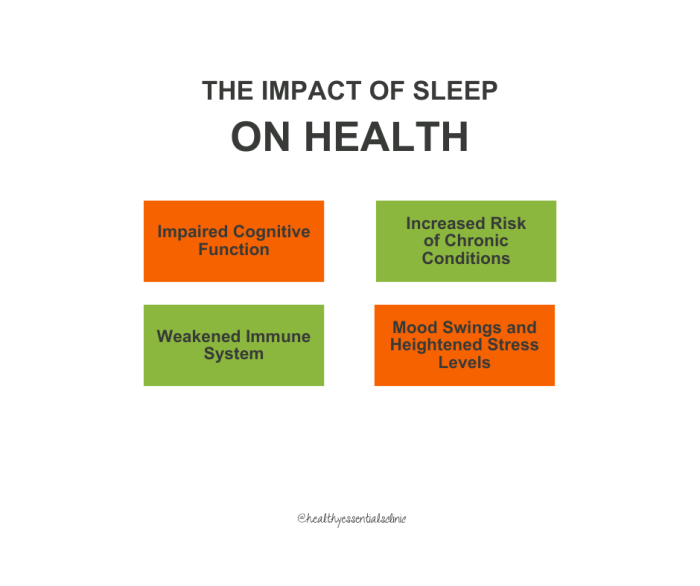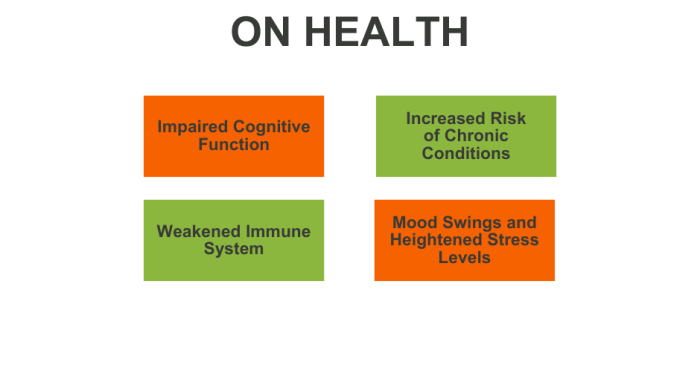Exploring the profound effects of sleep quality on overall health opens up a world of insights into the intricate relationship between our nightly rest and our well-being. Let's delve into the multifaceted dimensions of this critical aspect of health with a blend of informative content and engaging language.
As we uncover the layers of information surrounding sleep quality and its impact on our physical and mental health, a deeper understanding emerges, shedding light on the importance of quality sleep for our overall well-being.
The Importance of Sleep Quality

Quality sleep is crucial for maintaining overall health and well-being. It is during sleep that our bodies repair and rejuvenate, allowing us to function optimally during waking hours.
Impact of Poor Sleep Quality on Physical Health
Poor sleep quality can have detrimental effects on physical health. It has been linked to an increased risk of various health conditions, including obesity, heart disease, diabetes, and weakened immune function.
How Sleep Quality Affects Mental Well-being
Sleep quality also plays a significant role in mental well-being. Inadequate sleep can lead to mood disturbances, increased stress levels, difficulty concentrating, and an overall decline in cognitive function. It is essential for emotional regulation and mental clarity.
Factors Influencing Sleep Quality

Poor sleep quality can be influenced by various external factors and lifestyle choices. Additionally, stress levels play a significant role in determining the quality of sleep an individual gets.
External Factors Affecting Sleep Quality
- Light exposure: Exposure to bright lights before bedtime can disrupt the production of melatonin, a hormone that regulates sleep.
- Noise: Loud noises or disturbances during the night can interrupt the sleep cycle, leading to poor sleep quality.
- Temperature: Uncomfortable temperatures in the bedroom can make it difficult to fall asleep or stay asleep throughout the night.
Lifestyle Choices Impacting Sleep Quality
- Diet: Consuming heavy meals, caffeine, or alcohol close to bedtime can negatively impact sleep quality.
- Exercise: Lack of physical activity or exercising too close to bedtime can affect the ability to fall asleep easily.
- Sleep Environment: Uncomfortable bedding, excessive light, or noise in the bedroom can disrupt sleep patterns.
Stress Levels and Sleep Quality
- Increased Cortisol Levels: High stress levels can lead to elevated cortisol levels, which can interfere with the ability to fall asleep and stay asleep.
- Racing Thoughts: Stress and anxiety can cause racing thoughts, making it difficult to relax and unwind before bedtime.
- Nighttime Waking: Stress can contribute to frequent awakenings during the night, impacting the overall quality of sleep.
Effects of Poor Sleep Quality on Health
Poor sleep quality can have a significant impact on overall health, leading to various physical, mental, and cognitive issues. Let's explore some of the ways in which inadequate sleep can affect our well-being.
Physical Health Issues
Poor sleep quality has been linked to an increased risk of various physical health problems, such as obesity, heart disease, diabetes, and weakened immune system. Lack of quality sleep can disrupt hormonal balance, metabolism, and overall body function, contributing to these conditions.
Mental Health Disorders
The connection between lack of sleep and mental health disorders is well-documented. Chronic sleep deprivation can lead to mood disorders like depression and anxiety, as well as cognitive impairments. Sleep plays a crucial role in emotional regulation and brain function, so inadequate sleep can exacerbate these conditions.
Impact on Cognitive Functions
Inadequate sleep can significantly impact cognitive functions, including memory, concentration, and decision-making. Our brain processes information and consolidates memories during sleep, so when we don't get enough quality rest, these functions are compromised. This can result in decreased productivity, impaired learning, and overall cognitive decline.
Strategies for Improving Sleep Quality
Improving sleep quality involves adopting healthy sleep habits, creating a sleep-conducive environment, and establishing a bedtime routine. These strategies can significantly enhance the quality of your sleep and contribute to overall well-being.
Healthy Sleep Habits
- Avoid consuming caffeine or heavy meals close to bedtime.
- Establish a consistent sleep schedule by going to bed and waking up at the same time every day.
- Create a relaxing bedtime routine to signal your body that it's time to wind down.
- Ensure your bedroom is dark, quiet, and at a comfortable temperature for optimal sleep.
- Avoid screen time before bed as the blue light can interfere with your sleep cycle.
Sleep-Conducive Environment
- Invest in a comfortable mattress and pillows that support a good night's sleep.
- Keep your bedroom clutter-free and organized to promote relaxation.
- Use blackout curtains or a sleep mask to block out any light that may disrupt your sleep.
- Consider using white noise machines or earplugs to drown out any disruptive sounds.
Bedtime Routine
- Engage in calming activities like reading a book or taking a warm bath before bedtime.
- Avoid stimulating activities such as watching TV or working right before bed.
- Practice relaxation techniques like deep breathing or meditation to prepare your body for sleep.
- Limit exposure to bright lights in the evening to help regulate your body's internal clock.
Summary
In conclusion, the impact of sleep quality on overall health is undeniable, emphasizing the need to prioritize healthy sleep habits for a happier, healthier life. By recognizing the significance of quality sleep, we pave the way for a brighter future filled with vitality and wellness.
General Inquiries
How does poor sleep quality affect physical health?
Poor sleep quality can lead to various physical health issues such as weakened immune system, increased risk of heart diseases, and impaired cognitive functions.
What lifestyle choices can impact sleep quality?
Lifestyle choices like excessive screen time before bed, irregular sleep schedule, and consuming stimulants like caffeine can negatively impact sleep quality.
Is lack of sleep connected to mental health disorders?
Yes, inadequate sleep is linked to mental health disorders such as depression, anxiety, and mood disorders.
How can a bedtime routine enhance sleep quality?
Establishing a consistent bedtime routine signals to your body that it's time to wind down, making it easier to fall asleep and improve sleep quality.



